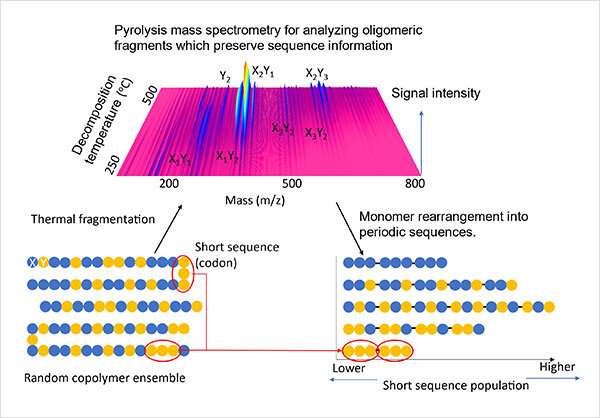This article has been reviewed according to Science X's editorial process and policies. Editors have highlighted the following attributes while ensuring the content's credibility:
fact-checked
peer-reviewed publication
trusted source
proofread
AI-based technique capable of determining the monomeric sequence of a polymer, for plastic recycling

The National Institute for Materials Science (NIMS) has developed an AI-based mass spectrometric technique capable of determining the monomeric sequence of a polymer. This technique may be useful in gaining a deeper understanding of basic polymeric structures, facilitating the development of new materials and helping solve plastic recycling problems. The work is published in the journal Chemical Science.
A polymer is a very large molecule composed of a chain of many (ranging from hundreds to hundreds of thousands) small molecules called monomers that are bonded together. Many common polymers (e.g., plastics and resins) are copolymers, consisting of several different types of monomers. During the copolymerization process, the monomers are stochastically arranged along the main-chain, generating sequence distribution.
Since this sequence distribution is thought to greatly influence the material performance of copolymeric materials, the development of a polymer sequencer—an analytical method for quantitatively evaluating the distribution—had been awaited as a potentially effective tool toward innovative polymer materials.
This research team recently developed the world's first practical polymer sequencer quantifying the short monomer segments in specific sequences, herein called "codon" using an analogy from nucleotide triplets, via pyrolysis mass-spectra. In this technique, an analyte copolymer is gradually heated from room temperature to 600°C, successively generating oligomeric fragments to be recorded by mass-spectrometry in order of their heat susceptibilities.
Based on the fragment patterns, virtual copolymers repeating a single codon species are reconstructed via AI analysis, allowing the quantification of the codon composition in the analyte. This polymer sequencer is applicable to various combinations of versatile monomers. In addition, the polymer sequencer may be used to analyze various other materials whose fragments vaporize during thermal treatment. These include insoluble or non-liquefiable sample materials and composites with inorganic constituents.
The research team plans to investigate the correlation between sequence distribution and copolymer properties and develop sequence-controlled polymerization techniques, using the developed polymer sequencer as the key technology. This attempt could improve the performance of various polymer materials and tackle environmental issues caused by plastics.
More information: Yusuke Hibi et al, A data-driven sequencer that unveils latent "codons" in synthetic copolymers, Chemical Science (2023). DOI: 10.1039/D2SC06974A
Journal information: Chemical Science
Provided by National Institute for Materials Science





















